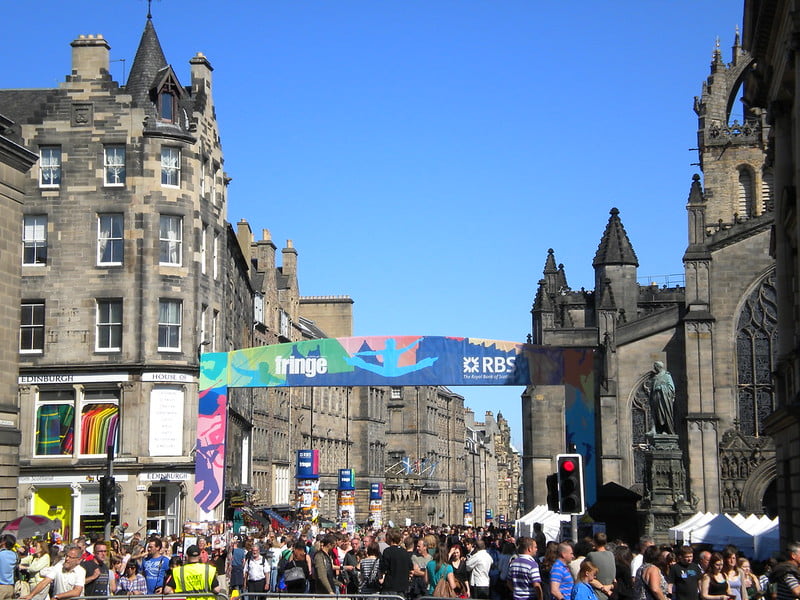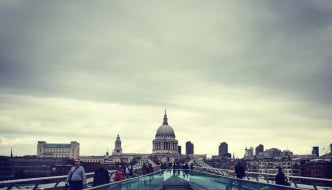
Credit: eltpics, @cgoodey on Flickr
When I moved to Edinburgh seven years ago, I immediately became involved with many of the different August festival opportunities. The pay was often poor, and the temporary nature of the work meant organisations regularly had no safeguarding, limited training and minimal support on hand if staff and freelancers were struggling.
As an Edinburgh resident the inevitable 45 minutes extra to get anywhere during August is infuriating. The inability to sit and have a quiet drink after a long day, during glorious weather, is exhausting. In August, Edinburgh no longer belongs to the people who live there, it belongs to the masses of slow-moving tourists, or the manic arts venturers rushing from venue to venue, gin in a tin in hand, several lanyards thrown around their necks. The city disappears under a mass of placards, flyers, posters and sounds. There’s minimal escape. Every May and June my landlord would be in touch, to say that the rent would need to increase. Two years in a row my flatmate and I were rudely reminded that during August the owners of our tiny two-bedroom flat could earn eight times what they did from us and needed to hike our rent as a result. Whilst the city is almost unliveable for one month of the year, the repercussions of it are felt year-round by its residents.
Morvern Cunningham has written extensibly on sustainable and practical ways the festivals can continue. For me, the bulk of the responsibility sits with The Fringe Society. They were responsible for almost 4000 shows and far more performers flooding the city in August 2019 alone. In that same year, Shona McCarthy The Fringe Society chief executive denounced a call from an organisation called Fair Fringe, which asked festival venues and organisations to ensure staff are being paid the living wage. McCarthy cited the call as “hyperbole”, and suggested organisations still needed to “wash their faces” economically. The Fringe Society cannot enforce any rules or regulations on any of the operators who are taking advantage of cultural workers during August. The Fringe Society itself is not running the festival. The venues are. This probably explains why The Fringe Society seem more concerned for venues and organisations making money, than vulnerable freelance and temporary staff earning anything at all.
As COVID-19 slammed the arts sector, the August festivals were hit drastically. Emergency funding was issued to organisations and individuals across Scotland. Creative Scotland were the first of any arts council in the UK to get hardship grants into artists pockets. Amongst all of this, the organisation who was given the most financial support, through 0% loans as well as government and city council grants was The Fringe Society. Over £3 million in support. The rhetoric being that without the society the festival would halt. August would look dramatically different for Edinburgh forever if they ceased business.
On the one hand The Fringe Society claims to be the backbone of the Fringe Festival, without them the August festivals would crumble, whilst on the other unable to ensure artists and freelancers are paid and cared for appropriately. This system does not work. You can’t be the boss without ensuring the workers are paid fairly.
In The Fringe Society’s latest call, artists are being invited to register their month long shows for £230 in August 2021. This amount will get you a webpage with a link to tickets (which The Fringe Society will still take a % of) and a brief sentence about the show in the Fringe Brochure, effectively an unreadable telephone book, of page after page of theatre and comedy projects. They are openly asking artists to submit to a festival they themselves don’t know will be running yet. Afterall, it is the venues who are working out whether they can open their doors or not.
Yet, artists are forced to sign up. The Fringe Society have created a monopoly on how artists are seen and celebrated at the festival through their marketing. Artists are left with no other options than to pay extortionate amounts for fear of missing out on audiences.
The gap between The Fringe Society and the artists it supposedly supports is perhaps best highlighted by the appointment of their new Chair of Directors: Benny Higgins. Associated with several multi-million-pound arts organisations, Higgins works on behalf of one of Scotland’s wealthiest landowners. He oversees billions of pounds worth of private land. Land which arguably should not belong to one sole person, but to the communities who have lived on it and cared for it for generations.
Just as The Fringe Society’s chair Benny Higgins has earnt millions from land which should belong to Scottish communities, so too are The Fringe Society earning millions from the artists and creatives without whom the festival would not exist. The monopoly The Fringe Society has created means artists and cultural workers aren’t being cared for. Furthermore, the business model relies on attracting more and more performers and theatre makers, adding to Edinburgh’s inevitable drowning. We need to take our land back from these monopolies.
I would urge us all to demand better. We all, whether artists, cultural workers, audiences or Edinburgh residents, deserve more. Creatives and freelancers deserve to be paid, temporary staff to be cared for, Edinburgh residents deserve to have a slice of their city spared from the August crowds. The Fringe Society can make that happen.
Filed under: Community
Tagged with: artists, audiences, Benny Higgins, comedy, covid-19, Edinburgh, Edinburgh Festival, Edinburgh Fringe, fee, Fringe Society, monopoly, representation, Scotland



Comments